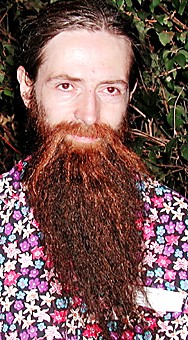A guest lecturer on Friday said people could live to be 1,000 years old because of science and engineering breakthroughs in the “”war on aging,”” an idea one student called “”radical”” but sparked interest among others.
Aubrey de Grey, a biogerontologist from the University of Cambridge, spoke to students and faculty about the possibility of ending the “”inevitability of aging.””
De Grey said aging is the result of accumulated molecular and cellular damage caused by metabolism, but it could be eliminated if those damages are repaired.
“”We could rejuvenate people at the molecular and cellular level,”” he said.
De Grey was invited by Kent Kemmish, a molecular and cellular biology senior who said he and other students are starting a biomedical and gerontology club on campus. The club will review literature regarding de Grey’s ideas and other human rejuvenation theories.
One area of de Grey’s research has involved locating microbes in graveyard soil that have enzymes that could allow human cells to break down “”intracellular junk,”” one of the seven causes of cell damage that he tried to repair.
De Grey said “”cures”” for aging will have to be developed for mice before they are developed for humans, and scientists may be able to double the life span of mice within 10 years.
De Grey said if researchers can obtain enough funding, it would be possible to double the remaining life span of a 55-year-old within 15 years of that milestone. And extending life spans to 1,000 years could happen within 25 years.
De Grey likened the hypothetical timeline to the rapid rate of significant breakthroughs in flight engineering after the first powered flight was achieved in 1903.
“”I think he’s a bit optimistic on the time scale, but I think he has some good ideas,”” said Jordan Swanson, a genetics graduate student.
De Grey said he looked at the mortality rate of 11-year-olds, the age group with the lowest mortality rate, to figure out what an average human life span would be if the aging process were eliminated.
“”If we had their mortality rate, we’d live to about 1,000,”” de Grey said.
De Grey’s ideas raised social, political and scientific questions from the audience.
“”It’s quite interesting and quite radical,”” said Kyri Pavlou, a computer science graduate student.
Pavlou said the “”war on aging”” is an interesting political, scientific, religious and philosophical subject, but he would have liked to hear more research involved with de Grey’s ideas at the lecture.
“”I’d rather have more science. I have a ton of questions for him,”” Pavlou said.
Tim Spriggs, a computer engineering senior, said he was open to learning about things in the future.
“”I’m very interested to see the outcomes of this,”” he said. “”It would cause people to think more long-term.””
Kate Spriggs, a computer science and mathematics senior, said she is concerned about the effects that a 1,000-year life span could have on society.
“”If people live to be 1,000, they’ll just keep using resources and wouldn’t contribute anything to society,”” said Kate Spriggs. “”And there will be a big problem with population.””
De Grey addressed some of the arguments against “”curing”” aging that he commonly hears at the lecture. Those arguments and more information about de Grey’s research and other research for curing aging can be found at de Grey’s Web site, www.sens.org.









